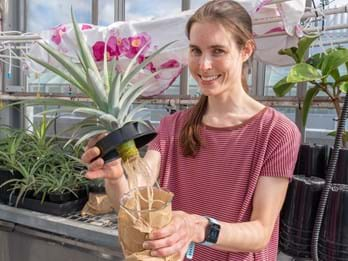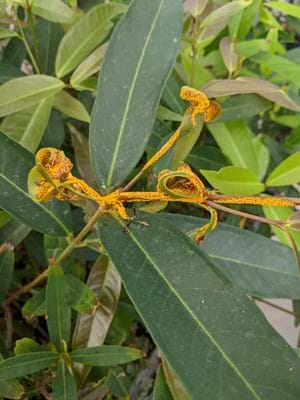RNA-based disease protection for plants
By John McDonald, National Biosecurity Manager

Dr Anne Sawyer, University of Queensland Research Fellow,
is investigating RNA vaccines for next generation crop protection,
with the support of GIA
RNA vaccines are the latest innovation in human health, but do RNA technologies have the same potential for plant protection?
Greenlife Industry Australia (GIA) is supporting Dr Anne Sawyer from The University of Queensland in her Advance Queensland Industry Research Fellowship ‘RNA vaccines for next generation crop protection: Facilitating adoption’ to answer the above question. GIA National Biosecurity Manager John McDonald believes that this type of innovative thinking and technical advancement is the future of pest management in horticulture whereby we ensure efficacy against the pest whilst meeting our stewardship responsibilities and social license.
Dr Sawyer is one of 19 awarded scientists from the 2021 Advance Queensland Industry Research Fellowships round, which support researchers to carry out original research to benefit Queensland while partnering with industry. Other partners in her research include the Queensland Department of Agriculture and Fisheries, Nufarm Limited, Scion New Zealand, Australian Pineapples, Kai Loa, Howe Farming Enterprises, Australian Native Products, the Australian Tea Tree Industry Association and the Australian Plant Biosecurity Science Foundation.
Dr Sawyer is developing RNA-based treatments to protect pineapple, Lemon Myrtle and tea tree from Phytophthora cinnamomi (cause of Phytophthora root rot) and Austropuccinia psidii (cause of myrtle rust). These two aggressive plant pathogens cause significant economic losses in cropping systems across Australia, including production nurseries, and pose significant threats to our delicate native environment. Phytophthora root rot is one of the most dreaded plant diseases impacting on tree and shrub production in Australia, across both exotic and native plant species. Myrtle rust is a highly invasive aerial fungal disease threatening more than 350 native Myrtaceae species and is one of the most significant challenges for Australia’s native plant producers.
Behaving like a vaccine, RNA treatment protects plants from disease by triggering RNA interference (RNAi), a natural defence mechanism, to silence essential pathogen genes in a very precise and specific way, ensuring that no beneficial organisms are targeted.
The RNA can be delivered through BioClay™, a University of Queensland-invented platform that uses clay particles as carriers. Unlike conventional synthetic fungicides, which can come with issues of resistance, run-off, lack of specificity, residues, and potential toxicity to humans and the environment, BioClay has the potential to be a sustainable, environmentally friendly plant protection platform.
Dr Sawyer and her team have shown that double stranded RNA (dsRNA) targeting essential rust genes significantly reduces myrtle rust symptoms on Syzygium jambos (Rose Apple) and they are now testing the RNA on Backhousia citriodora (Lemon Myrtle), Melaleuca alternifolia (Tea Tree), Decaspermum humile and Syzygium hodgkinsoniae (both native endangered species).
The researchers are also testing RNA treatments on pineapple and avocado to measure how effectively it protects against Phytophthora root rot and along with BioClay, are looking at other different application methods including foliar sprays, trunk injections and root drench/application to hydroponic growing media.
Both pathogens have large host ranges (>3,000 plant species for Phytophthora), therefore future targets of the technology will be other host plants e.g., macadamia/stone fruit for Phytophthora and Corymbia, Eucalyptus (native forestry), and Leptospermum (honey) for myrtle rust.
The BioClay platform has potential application for many plant pathogens and crops, with researchers at the ARC Hub for Sustainable Crop Protection (led by the University of Queensland) looking at using the technology to target other fungal pathogens. Other projects are looking at targeting insect pests and viruses.
For further information, please contact GIA's National Biosecurity Manager John McDonald at: john.mcdonald@greenlifeindustry.com.au.



